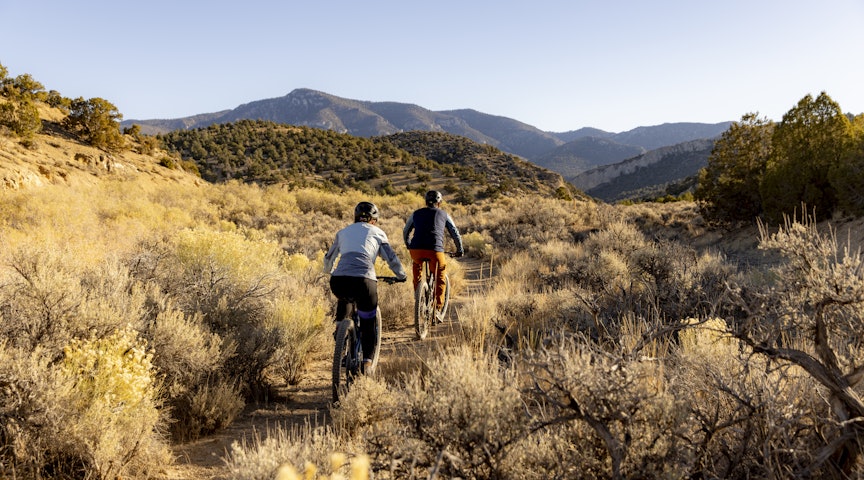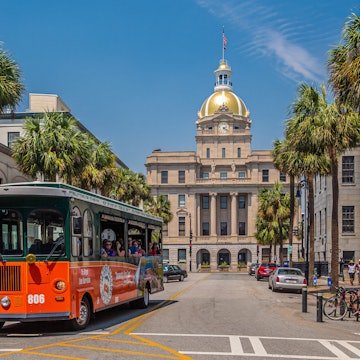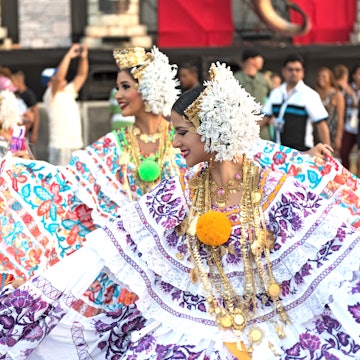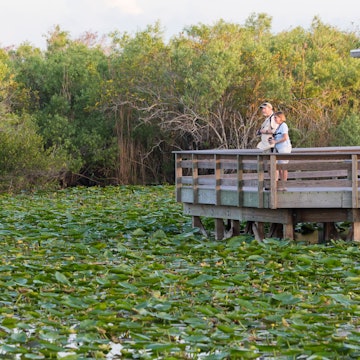
Where to explore Gullah Geechee culture in the Southeastern US
Aug 5, 2024 • 7 min read

Kitty Green leads tours of that bring to life Gullah Geechie culture on South Carolina’s St Helena Island. Ethan Payne for Lonely Planet
I remember my amazement when I first learned that the famous song “Kumbaya” – a spiritual known by every kid who’s ever gone to summer camp – is in fact a Gullah Geechee tune. What the layperson hears as three soothing syllables in fact means “come by here” to the Gullah Geechee community.
This is how Gullah culture has operated for hundreds of years in the USA. Its influence on Southern and greater American culture has always been there, even if its roots haven’t been fully known or acknowledged. Order a heaping plate of shrimp and grits or a hoppin’ John for a taste of Gullah culinary ways. Watch high school and college groups perform step routines, and you’ll see similarities to hamboning, a traditional Gullah rhythm-and-movement technique.
So just who are the Gullah Geechee people? Like many, they are African Americans descended from people enslaved in the US. What distinguishes them is where their ancestors were enslaved: on and near the barrier islands that stretch from Wilmington, North Carolina down the coastline to Jacksonville, Florida. These communities were more isolated than those of Black Americans elsewhere in the country, which allowed the Gullah Geechee to preserve more of their African heritage. Their creole language, called Gullah (or sometimes Geechee, a Gullah dialect), uses a mix of words from English and several African languages. As we see with “Kumbaya,” most Americans know at least one or two Gullah words.
Today, most Gullah and Geechee folks (the latter usually refers to communities closer to the Ogeechee River near Savannah) live in communities that hug the coasts of South Carolina and Georgia, although their descendants can be found across the country. Following the string of barrier islands along the seaboard will bring the Gullah Geechee front and center.
From north to south, here are some of the best places to go to get immersed in their culture.
Lowcountry, South Carolina and Georgia is one of the best regions to visit next year. See our full list of Best in Travel 2025 winners.
1. Reaves Chapel, Navassa, North Carolina
Reaves Chapel AME Church is one of the oldest structures built for African Americans in North Carolina. Efforts are underway to help preserve the building, and make it a stop on a more in-depth Gullah Geechee tour of coastal North Carolina. Visitors can’t go inside, but can visit the community of Reaves, historically a Gullah Geechee one.
2. Poplar Grove Plantation, Wilmington, North Carolina
This former sweet potato–and–peanut plantation is now listed on the National Register of Historic Places, and is a stop on the National Park Service’s Gullah Geechee Cultural Heritage Corridor. Exhibits on the property bring to life experiences of Black Americans from the Civil War through the Civil Rights movement, as well as the cultural significance of the peanut crop to Gullah culture.
3. Gullah Museum, Georgetown, South Carolina
Founded by members of the Gullah community, this engaging one-room museum tells a full story of Gullah history and culture. Learn about Gullah foodways, music, language and religious practices through a number of artifacts displayed in this museum in historic downtown Georgetown.

5. International African American Museum, Charleston, South Carolina
Open since 2023, the International African American Museum tells an overarching story of African-descended people in the US – a chapter of which covers the Gullah Geechee. Learn about the flat-bottomed boats Gullah Geechee people use to navigate the Lowcountry’s marshes, as well as such spiritual practices as the ring shout.
6. Gullah Tours, Charleston, South Carolina
Tour guide Alphonso Brown grew up in Rantowles, South Carolina, in and around Gullah culture. His tour takes visitors around several sites in Charleston of significance to Gullah culture and Black history.
7. Hannibal’s Kitchen, Charleston, South Carolina
This casual Charleston restaurant has been serving soul food and Gullah cuisine since 1985. There’s typically a wait after customers order – but this ensures the food comes out hot and fresh. The crab rice is a must-try. Another Gullah specialty on the menu is the okra soup.

7. Charleston City Market, Charleston, South Carolina
One of the oldest commercial spaces in the country, Charleston City Market has been operating for more than 200 years. Inside the market, you’ll find several Gullah artisans selling their signature sweetgrass baskets. Weaving these is a tradition specific to the coastal Gullah people.
8. Joseph Fields Farm, Johns Island, South Carolina
About 25 minutes outside of Charleston, this family farm is owned and operated by Joseph Fields, a third-generation Gullah farmer. Visit the farm stand on the property to pick out fresh fruits and vegetables, or visit during strawberry season to pick your own fruit.
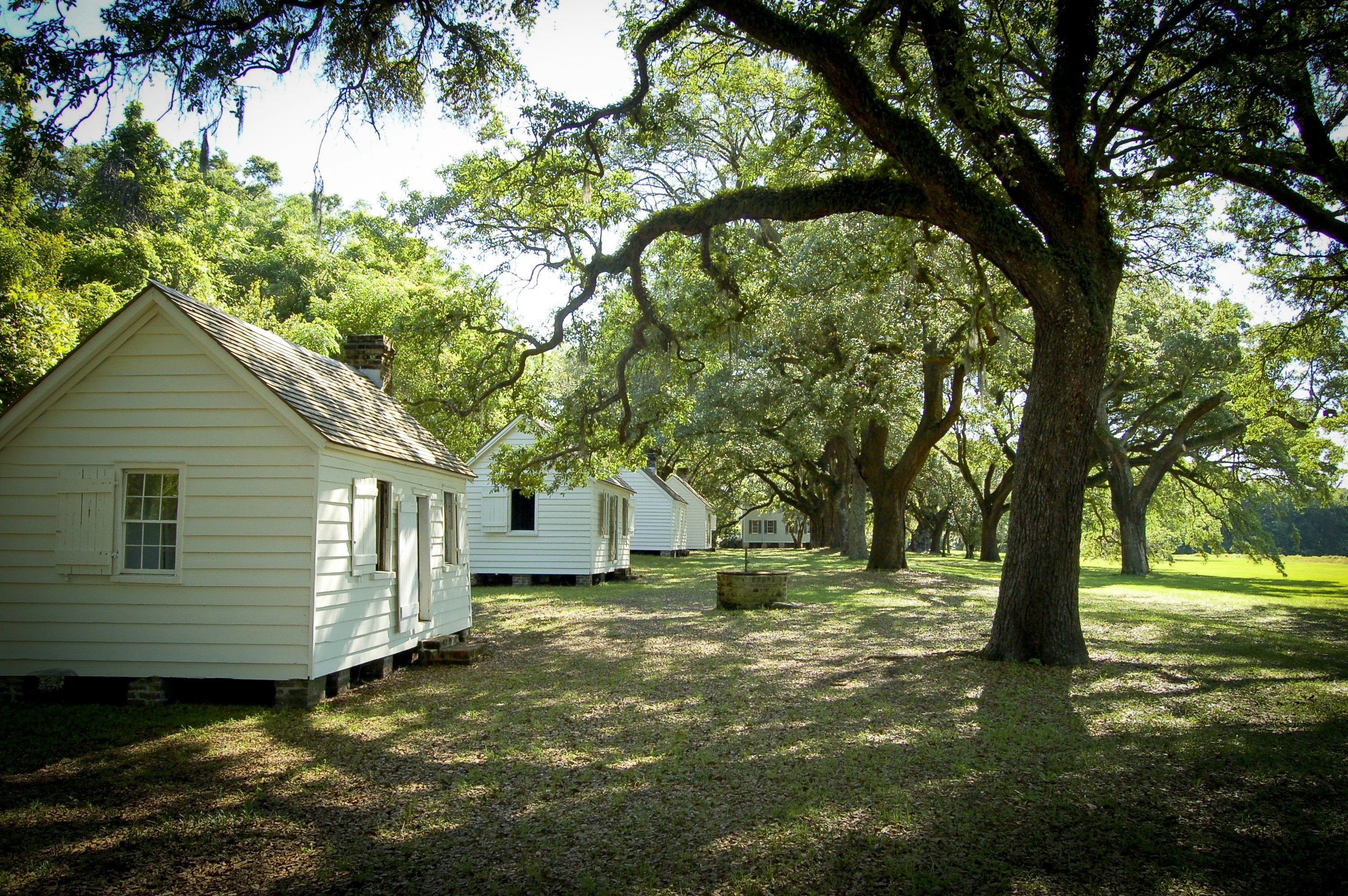
9. McLeod Plantation, James Island, South Carolina
This former plantation is now a historical park managed by the local government, one dedicated to sharing the perspective and experiences of the Gullah Geechee people. Park admission includes access to guided interpretive tours, which include information on Gullah Geechee culture, and the labor involved in growing and processing cotton.
Planning tip: Turn these Charleston-area sites into a larger three-day itinerary – one that requires making only one advance reservation. Here’s how to do it:
Day 1: Begin in Charleston with the Gullah Tours guided tour. In addition to sharing his deep knowledge about Gullah history and culture, Alphonso Brown will help you get the lay of the land. After the tour, visit the basket weavers at Charleston City Market.
Day 2: Start your morning with a visit to the McLeod Plantation, then head back to Charleston and grab lunch at Hannibal’s Kitchen. Spend the afternoon inside the air-conditioned galleries of the International African American Museum.
Day 3: Whether you’re heading onward on a road trip or stopping by on the way to one of the nearby beaches, pick up some fresh produce at Joseph Fields Farm.

10. The Gullah Grub, St Helena’s Island, South Carolina
Chef and owner Bill Green has been serving seasonal, farm-to-table dishes for more than 15 years at his restaurant. Gullah cuisine is front and center, with a focus on rice dishes and seafood gumbo.
11. Underground Tours of Savannah, Savannah, Georgia
Get the full story of Black American history and culture straight from a truth teller of the community: Sistah Pat, a local Gullah Geechee woman and CEO of Underground Tours of Savannah. She guides people along Savannah’s downtown streets, sharing the stories of the people who were enslaved in this antebellum city.
12. Beach Institute, Savannah, Georgia
The Beach Institute offers African American perspectives as expressed through art. The exhibits here showcase quilt making, an important African American tradition, as well as collections of folk art, sculpture and paintings. It’s owned by the King-Tisdell Cottage Foundation, whose mission is to preserve the history of Black Americans in Savannah and the Sea Islands.
13. Pin Point Heritage Museum, Montgomery, Georgia
Inside a former oyster factory, this museum pays homage to the Gullah Geechee community from the small Chatham County settlement of Pin Point (whose most famous son is Supreme Court Justice Clarence Thomas). The museum showcases how the community has lived with and made a living from the coastal waters that surround it.
Planning tip: You can check off all three Savannah sites in one or two days. Follow your tour with Sistah Pat with a visit to the Beach Institute. Since it’s just a 20-minute drive from there to Pin Point, consider that visit for day two to strike a more leisurely pace.

15. First African Baptist Church, Cumberland Island, Georgia
Formerly enslaved people built this church – now listed on the National Register of Historic Places – in the late 19th century. The conditions of Cumberland Island have helped preserve the humble structure: the area is a federally protected national seashore where personal vehicles are forbidden. The church is open to the public, but is only reachable by a 15-mile hike or bike ride, or by booking the Lands & Legacies Tour.
16. Historic Harrington School, St Simons Island, Georgia
Built in 1920, this one-room school educated African American children on St Simons Island for decades. The school also served as a place for the community to gather for special events. The community of Harrington traces its origins to formerly enslaved people who had labored on nearby plantations.

17. Kingsley Plantation, North Jacksonville, Florida
What was once a sea-island cotton plantation is now part of the Timucan Ecological and Historic Park and Preserve, managed by the National Park Service. Visit an old community made of several tabby cabins where enslaved once people lived. And learn about Gullah Jack Pritchard, an African American folk hero, insurrectionist and conjurer.
18. Foxy Lady Café, Jacksonville, Florida
Chef and owner Shandon Benjamin-Fox launched her restaurant in 2015 to share the recipes her mother and grandmother passed down to her. But this isn’t your typical soul-food restaurant: non-traditional Southern comfort food is what Benjamin-Fox serves up in such menu choices as the “foxy oxtail sandwich,” jambalaya Alfredo and pound cake for dessert.
Take your United States (USA) trip with Lonely Planet Journeys
Time to book that trip to United States (USA)
Lonely Planet Journeys takes you there with fully customizable trips to top destinations – all crafted by our local experts.
